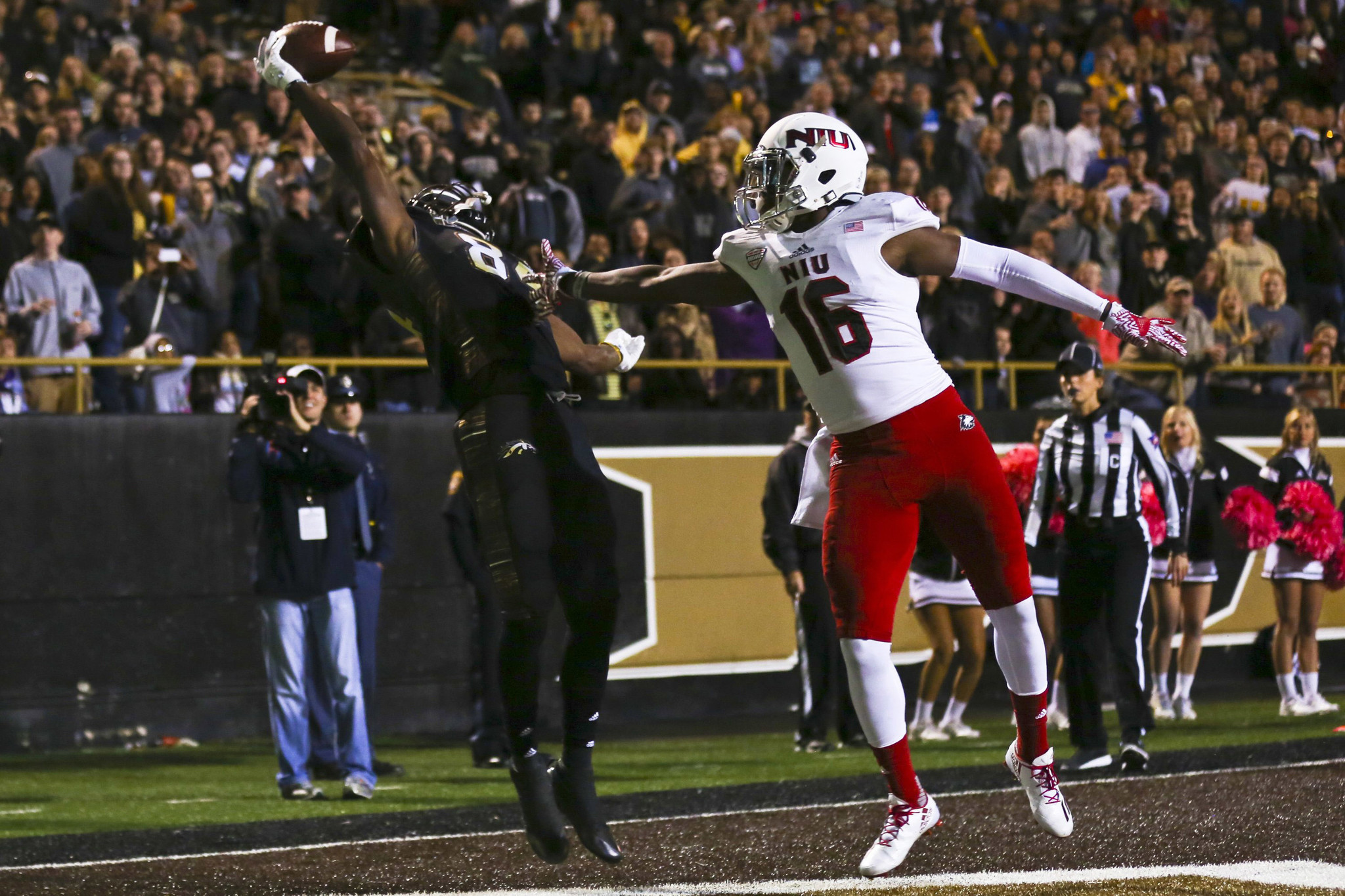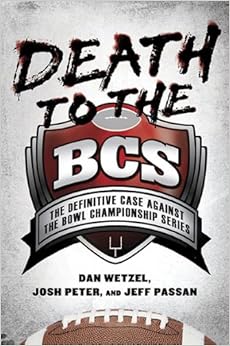All of my watching of games, and all of the data entry that goes with it... it all comes down to this.
I think this is a tie for the earliest I've ever been able to do this, but now that it's impossible for me to leave out any of the 11 remaining undefeated teams in college football, the time has come for me to build my first mock bracket for the Death to the BCS Playoffs.
Regular readers of Confessions of a Sportscaster are probably familiar with the format of this playoff, but if you're new here or missed out on
my season introduction post, the basic premise of the Death to the BCS Playoffs follows the ideas set forth in the book of the same title pictured here written by Dan Wetzel, Josh Peter, and Jeff Passan. The College Football Playoff and its four team playoff is a good start, but the system still discriminates against some of the smaller conferences at this level by refusing to give them a chance to play for a national title. The Death to the BCS Playoffs remedy this by granting an automatic bid to each of the 10 conference champions, and we then fill the field with six at large teams for a total of 16. This then plays out in a classic bracket, but instead of playing quarterfinals or semifinals at bowl game sites, we up the stakes for the regular season by seeding the teams 1-16 and giving home field advantage for the first three rounds to the highest seeds before playing the national title game at the Rose Bowl because it's the Rose Bowl.
 |
| Photo by Scott Halleran (Getty Images) |
To fill this field, especially for the mocks, I need to make some assumptions about presumed conference "champions" until the actual title games take place. But to seed the teams, I use a wealth of data I've collected.
Non-Conference Schedule Strength (NCSS) gets factored in to a minor degree just to see what kind of non-conference slate each team plays, though as a general rule the Group of Five teams score higher than those from Power Conferences, just based on how the metric is calculated. I also factor in Playoff Points of three varieties: First Degree (PP1), which is just a sum of wins of defeated opponents by any given team, Second Degree (PP2), which averages the First Degree Playoff Points of each defeated opponent by a given team, and a new one this year in Adjusted Playoff Points (aPP), which takes the aforementioned sum of wins by defeated opponents, but subtracts the losses of opponents that beat the given team to arrive at a final score, which can be negative. All of this data can be found on
this Google Sheet.
In an effort to remove any potential bias on my part, I also take multiple computer rankings into account to serve as a check as well as additional data to help arrive at a reasonable conclusion. Here's the important catch: unlike the old BCS, which refused to factor in margin of victory out of some misguided notion of sportsmanship, these computer rankings all include that factor because blowout wins should be valued more than a narrow victory. The two computer ranking systems I have used in years past are
Jeff Sagarin's (SAG) rankings, as he used to do rankings for the BCS, but also did a ranking that factored margin of victory in. The late David Rothman (ROTH) built a similar ranking formula that included margin of victory, and before he died he made his formula public.
A UCLA faculty member uses that formula to set up rankings of his own. Since said faculty member hasn't run his numbers for the 2016 season yet, I'm adding in a third ranking, and will use all three for the final selection. I discovered that the team over at
All My Sports Teams Suck (AMSTS) run a formula to build a ranking as well, and
they also factor in score, at least as a check, to help arrive at a final conclusion.
All of these data will combine together in a somewhat organic fashion (read: I look things over and try to make a fair decision based on the available data) to seed the 16 teams who will face off for the national championship. So, without further ado, here's my first mock bracket for the 2016 season.
- Michigan (6-0, Big Ten "Champion")- NCSS: 4, PP1: 20, PP2: 6.50, aPP: 20, SAG: 3, ROTH: N/A, AMSTS: 1.
- Texas A&M (6-0, SEC "Champion")- NCSS: 1, PP1: 18, PP2: 7.67, aPP: 18, SAG: 7, ROTH: N/A, AMSTS: 2.
- Clemson (6-0, ACC "Champion")- NCSS: 3, PP1: 18, PP2: 5.33, aPP: 18, SAG: 4, ROTH: N/A, AMSTS: 3.
- Alabama (6-0, At Large)- NCSS: 4, PP1: 19, PP2: 5.83, aPP: 19, SAG: 2, ROTH: N/A, AMSTS: 5.
- Ohio State (5-0, At Large)- NCSS: 5, PP1: 13, PP2: 4.00, aPP: 13, SAG: 1, ROTH: N/A, AMSTS: 4.
- Washington (6-0, Pac-12 "Champion")- NCSS: 2, PP1: 12, PP2: 3.17, aPP: 12, SAG: 5, ROTH: N/A, AMSTS: 6.
- Nebraska (5-0, At Large)- NCSS: 4, PP1: 10, PP2: 3.40, aPP: 10, SAG: 22, ROTH: N/A, AMSTS: 10.
- Tennessee (5-1, At Large)- NCSS: 4, PP1: 18, PP2: 7.40, aPP: 18, SAG: 15, ROTH: N/A, AMSTS: 7.
- Western Michigan (6-0, MAC "Champion")- NCSS: 6, PP1: 11, PP2: 3.83, aPP: 11, SAG: 28, ROTH: N/A, AMSTS: 9.
- Louisville (4-1, At Large)- NCSS: 3, PP1: 9, PP2: 3.75, aPP: 9, SAG: 6, ROTH: N/A, AMSTS: 8.
- Boise State (5-0, Mountain West "Champion")- NCSS: 7, PP1: 11, PP2: 2.60, aPP: 10, SAG: 23, ROTH: N/A, AMSTS: 11.
- West Virginia (4-0, At Large)- NCSS: 2, PP1: 8, PP2: 4.00, aPP: 8, SAG: 29, ROTH: N/A, AMSTS: 14.
- Navy (4-1, American Athletic "Champion")- NCSS: 1, PP1: 11, PP2: 4.75, aPP: 10, SAG: 55, ROTH: N/A, AMSTS: 24.
- Oklahoma (3-2, Big XII "Champion")- NCSS: 4, PP1: 7, PP2: 2.33, aPP: 6, SAG: 11, ROTH: N/A, AMSTS: 36.
- Troy (4-1, Sun Belt "Champion")- NCSS: 4, PP1: 9, PP2: 2.75, aPP: 9, SAG: 63, ROTH: N/A, AMSTS: 19.
- Middle Tennessee (4-1, Conference USA "Champion")- NCSS: 4, PP1: 7, PP2: 1.25, aPP: 3, SAG: 72, ROTH: N/A, AMSTS: 54.
You'll notice that one undefeated team did not make the playoffs, but that is by design; Baylor has been banned from the Death to the BCS Playoffs due to their sexual assault scandal. It's the first time, even in a mock, I've had to knock out a team that would otherwise have made it, unless you think I hosed the 2015 North Carolina team that played two FCS teams. So Bears fans: I'm not sorry.
 |
| Photo by Michael Reeves (Getty Images) |
There were multiple teams I considered for the top overall spot, but it ultimately came down to two: Michigan and A&M. Michigan's higher PP1, APP, and computer rankings earned them the berth ahead of the Aggies, who still get three home games in this setup. You can argue Clemson could top A&M, but the Tigers dont' have as good of a PP2, even though the computers like them slightly more on average. Alabama is only an at large because they're short a conference game on A&M, but they're clearly one of the best teams in the nation and have earned a second home game.
 |
| Photographer uncredited (Photo from Fansided.com) |
Things got a little more complicated from here. There are another six undefeated teams on here, and Ohio State, thanks to a #1 computer rankings and reasonable PP1 get the #5 seed ahead of Washington, who has one more win but one less PP1, and the computers aren't as big of fans. Nebraska slots in right after them with lower PP1 and computer rankings. Those three teams, by virtue of their undefeated status, get the nod over Tennessee, who gets the final first round home game thanks to having the second most PP1 and aPP.
 |
| Photographer uncredited (Photo from Chicago Tribune) |
Those significantly higher scores net the Volunteers a first round date with Western Michigan, who is undefeated but doesn't have quite as good of metrics as Tennessee, but are good enough to get the #9 seed. Louisville slots in next, mostly thanks to their computer rankings even though their Playoff Points aren't nearly as good. We then close out with the last two unbeaten teams eligible in Boise State and West Virginia, with the Broncos getting the edge thanks mainly to the extra game they've played so far.
 |
| Photographer uncredited (Photo from Fansided.com) |
We then round out with four conference champions. Navy currently leads the American Athletic Conference after their big win over Houston this past weekend, and they ride that to the #13 seed. Oklahoma comes up next as the only two-loss team in the field, but the computers like them ahead of the final two teams even if Playoff Points are close. Troy is better across the board than Middle Tennessee, possibly due to Conference USA being all kinds of awful, and so the Trojans get the #15 seed.
My toughest out at this early stage would have to be Houston, following that tough loss, but despite the computers liking them the rest of the metrics aren't huge fans. If Oklahoma wasn't the Big XII autobid this week, I would have taken Houston over Oklahoma. My next out is probably Arizona State, though Sagarin isn't a huge fan. Teams like Virginia Tech are also on my radar. Of course, this is one of the harder mocks to make because of the sheer number of undefeated teams and games left to be played.
That does it for this week. I'll be back in the morning with a look at the Week 7 schedule and how it impacts NCSS scores.






No comments:
Post a Comment